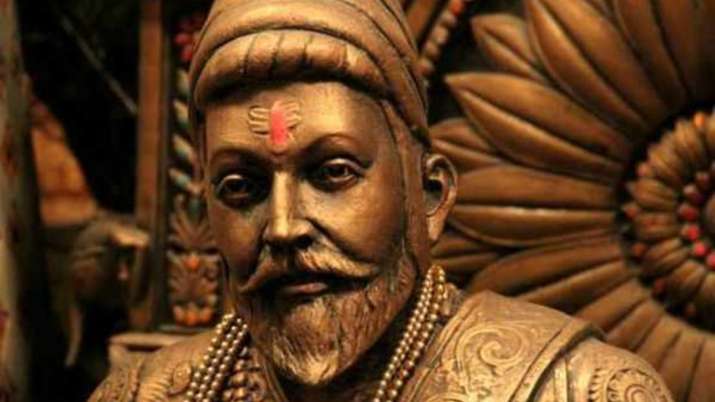Birth anniversary of India's Greatest Warrior
 •
by
•
by KingSlayer III

For those unversed, why this day is celebrated, it marks the birth anniversary of Chhatrapati Shivaji Maharaj, the first Chhatrapati(protector of people) and founder of the Maratha Empire. Chhatrapati Shivaji Maharaj was also the staunch promoter of secularism and roused the sleeping conscience of the nation. He was the ultimate man of the father of freedom movement in Maharashtra and source of inspiration to the people throughout India.
Shivaji was skilled in mapping out military missions in an intellectual way so that they are able to assure victory with the least possible loss to their force. He planned stealthy war ops, fled from house arrest in Agra and craftily adopted a stance of peace or violence depending upon his chances at victory. He established a secular governance and remove the additional Jazia tax which taxes non-islam civilians and protected women from Mughal's sexual violence and he has established a fierce navy defending his territory from portugese.
One of the fort wall:

An island fort:


Before Maratha empire:

Peak of Maratha empire:

History:
Shivaji Bhosle was born on February 19, 1630 to Shahaji Bhosle and Jijabai in the fort of Shivneri, near the city of Junnar of the Pune district. Shivaji's father Shahaji was in service of the Bijapuri Sultanate - a tripartite association between Bijapur, Ahmednagar, and Golconda, as a general. He also owned a Jaigirdari near Pune. Shivaji's mother Jijabai was the daughter of Sindkhed leader Lakhujirao Jadhav and a deeply religious woman. Shivaji was especially close to his mother who instilled in him a strict sense of right and wrong. Since Shahaji spent most of hi
 s time outside of Pune, the responsibility of overseeing Shivajiâ's education rested on the shoulders of a small council of ministers which included a Peshwa (Shamrao Nilkanth),a Mazumdar (Balkrishna Pant), a Sabnis (Raghunath Ballal), a Dabir (Sonopant) and a chief teacher (Dadoji Konddeo). Kanhoji Jedhe and Baji Pasalkar were appointed to train Shivaji in military and martial arts. Shivaji was married to Saibai Nimbalkar in 1640. Shivaji Maharaj turned out to be a born leader from a very young age. By the age of 16, Shivaji Maharaj managed to gather a band of fiercely loyal Maratha men and set about conquering nearby lands. Their first triumph was the capture of Torna Fort of the Bijapur Kingdom. By 1647 he had captured Kondana and Rajgad forts and had control of much of the southern Pune region. In a bid to contain Shivaji, Adil Shah sent Afzal Khan, an experienced veteran general along with an army of 40,000 men to destroy Shivaji Maharaj. Afzal Khan tried to kill him in a private meeting, but Shivaji was on his guard. He killed Afzal Khan with his bakhna and destroyed Bijapur army. The King of Bijapur made peace with him. Shivaji's conflicts with the Bijapuri Sultanate and his continuous victories brought him under the radar of Mughal Emperor Aurangzeb. Aurangzeb saw him as a threat to expansion of his imperial intent and concentrated his efforts on eradicating the Maratha threat. Confrontations began in 1657, when Shivaji's generals raided and looted Mughal territories near Ahmednagar and Junnar. However, Aurangzeb's retaliation was thwarted by arrival of rainy season and battle for succession back in Delhi. Aurangzeb directed Shaista Khan, Governor of Deccan and his maternal uncle, to subdue Shivaji. Shaista Khan launched a massive attack against Shivaji, capturing several forts under his control and even his capital Poona. Shivaji retaliated back by launching a stealth attack on Shaista Khan, eventually injuring him and evicting him from Poona. Shaista Khan later arranged multiple attacks on Shivaji, severely reducing his holds of forts in the Konkan region. To replenish his depleted treasury, Shivaji attacked Surat, an important Mughal trading center and looted the Mughal wealth. An infuriated Aurangzeb sent his chief general Jai Singh I with an army of 150,000. The Mughal forces made considerable dent, sieging forts under Shivaji's control, extracting money and slaughtering soldiers in their wake. Shivaji agreed to come to an agreement with Aurangzeb to prevent further loss of life and the Treaty of Purandar was signed between Shivaji and Jai Singh on June 11, 1665. Shivaji agreed to surrender 23 forts and pay a sum of 400000 as compensation to the Mughal Empire. Aurangzeb invited Shivaji to Agra with an aim to use his military prowess to consolidate Mughal empires in Afghanistan. Shivaji travelled to Agra with his eight year old son Sambhaji and was offended by Aurangzeb's treatment of him. He stormed out of the court and an offended Aurangzeb placed him under house arrest. But Shivaji once again used his wit and cunning to escape the imprisonment. He feigned severe illness and arranged for baskets of sweets to be sent to temple as offerings for prayer. He disguised as one of the carriers and hid his son in one of the baskets, and escaped on August 17, 1666. In subsequent times, Mughal and Maratha hostilities were pacified to a large extent by constant mediation through Mughal Sardar Jaswant Singh. Peace lasted till 1670, after which Shivaji launched an all-out offense against the Mughals. He recovered most of his territories sieged by the Mughals within four months. Shivaji died at the age of 52 on April 3, 1680, at the Raigad Fort, after suffering from a bout of dysentery. A conflict of succession arose after his death between his eldest son Sambhaji and his third wife Soyrabai on behalf of her 10-year old son Rajaram. Sambhaji dethroned the young Rajaram and ascended the throne himself on June 20, 1680.the Mughal-Maratha conflicts continued after Shivaji's death and the Maratha glory declined greatly. However it was reclaimed by young Madhavrao Peshwa who reclaimed Maratha glory and established his authority over North India.
s time outside of Pune, the responsibility of overseeing Shivajiâ's education rested on the shoulders of a small council of ministers which included a Peshwa (Shamrao Nilkanth),a Mazumdar (Balkrishna Pant), a Sabnis (Raghunath Ballal), a Dabir (Sonopant) and a chief teacher (Dadoji Konddeo). Kanhoji Jedhe and Baji Pasalkar were appointed to train Shivaji in military and martial arts. Shivaji was married to Saibai Nimbalkar in 1640. Shivaji Maharaj turned out to be a born leader from a very young age. By the age of 16, Shivaji Maharaj managed to gather a band of fiercely loyal Maratha men and set about conquering nearby lands. Their first triumph was the capture of Torna Fort of the Bijapur Kingdom. By 1647 he had captured Kondana and Rajgad forts and had control of much of the southern Pune region. In a bid to contain Shivaji, Adil Shah sent Afzal Khan, an experienced veteran general along with an army of 40,000 men to destroy Shivaji Maharaj. Afzal Khan tried to kill him in a private meeting, but Shivaji was on his guard. He killed Afzal Khan with his bakhna and destroyed Bijapur army. The King of Bijapur made peace with him. Shivaji's conflicts with the Bijapuri Sultanate and his continuous victories brought him under the radar of Mughal Emperor Aurangzeb. Aurangzeb saw him as a threat to expansion of his imperial intent and concentrated his efforts on eradicating the Maratha threat. Confrontations began in 1657, when Shivaji's generals raided and looted Mughal territories near Ahmednagar and Junnar. However, Aurangzeb's retaliation was thwarted by arrival of rainy season and battle for succession back in Delhi. Aurangzeb directed Shaista Khan, Governor of Deccan and his maternal uncle, to subdue Shivaji. Shaista Khan launched a massive attack against Shivaji, capturing several forts under his control and even his capital Poona. Shivaji retaliated back by launching a stealth attack on Shaista Khan, eventually injuring him and evicting him from Poona. Shaista Khan later arranged multiple attacks on Shivaji, severely reducing his holds of forts in the Konkan region. To replenish his depleted treasury, Shivaji attacked Surat, an important Mughal trading center and looted the Mughal wealth. An infuriated Aurangzeb sent his chief general Jai Singh I with an army of 150,000. The Mughal forces made considerable dent, sieging forts under Shivaji's control, extracting money and slaughtering soldiers in their wake. Shivaji agreed to come to an agreement with Aurangzeb to prevent further loss of life and the Treaty of Purandar was signed between Shivaji and Jai Singh on June 11, 1665. Shivaji agreed to surrender 23 forts and pay a sum of 400000 as compensation to the Mughal Empire. Aurangzeb invited Shivaji to Agra with an aim to use his military prowess to consolidate Mughal empires in Afghanistan. Shivaji travelled to Agra with his eight year old son Sambhaji and was offended by Aurangzeb's treatment of him. He stormed out of the court and an offended Aurangzeb placed him under house arrest. But Shivaji once again used his wit and cunning to escape the imprisonment. He feigned severe illness and arranged for baskets of sweets to be sent to temple as offerings for prayer. He disguised as one of the carriers and hid his son in one of the baskets, and escaped on August 17, 1666. In subsequent times, Mughal and Maratha hostilities were pacified to a large extent by constant mediation through Mughal Sardar Jaswant Singh. Peace lasted till 1670, after which Shivaji launched an all-out offense against the Mughals. He recovered most of his territories sieged by the Mughals within four months. Shivaji died at the age of 52 on April 3, 1680, at the Raigad Fort, after suffering from a bout of dysentery. A conflict of succession arose after his death between his eldest son Sambhaji and his third wife Soyrabai on behalf of her 10-year old son Rajaram. Sambhaji dethroned the young Rajaram and ascended the throne himself on June 20, 1680.the Mughal-Maratha conflicts continued after Shivaji's death and the Maratha glory declined greatly. However it was reclaimed by young Madhavrao Peshwa who reclaimed Maratha glory and established his authority over North India.copied from internet sources!


Comments
Why do we have to brand him as a promoter of secularism? He ruled Hindu people in Hindu land. What is the need for him to be secular?
Because he had non-hindus living in Indian lands 🙂 He has given higher positions in military as well!
While, Shivaji maharaj had removed the tax based on person's religion, so isnt it promoting secularism?
He was "Common Man's King"... Please don't associate him with king of perticular religion. He personally was Hindu but he never disrespected or tried to convert anyone else to his religion.
“Har-Har Mahadev!"
o7
Jai Bhavani, Jai Shivaji!
Press name: Dota2 News
Posts: Non dota news 😛
hahaha..
player name: wittyprakash
posts: witless 😛 😛
just kidding 🙂
🤣🤣🤣🤣🤣🤣
BUURRRRRRNNNNNNNNNN
Tatti for LT CP position.
As soon as I saw India's Greatest Warrior I thought it was an article about me. But then I realized it was about RL India.
o7
Vote
o7
Nice, birthday twins 👀
lol xD
o7
Very well written article ❤️
please. subscribe to my newspaper erepublik.com/en/main/newspaper/what-you-say--308432/1